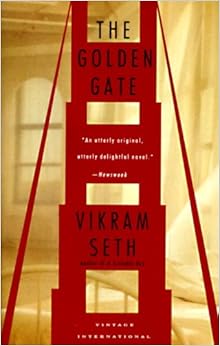Into an amorous mist, let's shift
Our lens, Dear Reader, to a locus
An hour south along that rift
That unnerves half of California:
Not just the crusty cohorts born here
But all who earn their bread and salt
Along the San Andreas fault.
Commerce and learning, manufacture
And government proceed above,
And nature's loveliness, and love;
Beneath them lies the hideous fracture,
Author of the convulsive shocks
That rip the hills and split the rocks.
I have a suspicion that Vikram Seth's verse novel The Golden Gate was conceived when the author realized that you could rhyme the words "Reagan" and "Onegin." It owes much to each of those figures, one real, one literary: It's the story of a group of yuppie friends in 1980's California, navigating sex and love at the onset of the Silicon Valley tech boom, but it's written in what are known as "Onegin stanzas," the poetic form popularized by Pushkin's verse novel Eugene Onegin. Onegin stanzas are sonnets with a characteristic rhyming scheme, but in tetrameter, not pentameter, and as such they tend to sound closer to clipped doggerel than flowing Shakespearean lines. Seth tries to use their inherent goofiness to his advantage:
He thinks back to his days at college,
To Phil, to Berkeley friends, to nights
When the pursuit of grades and knowledge
Foundered in beery jokes and flights.
Eheu fugaces... Silcon Valley
Lures to ambition's ulcer alley
Young graduates with siren screams
Of power and wealth beyond their dreams,
Ejects the lax, and drives the driven,
Burning their candles at both ends.
Thus files take precedence over friends,
Labor is lauded, leisure riven.
John kneels bareheaded and unshod
Before the Chip, a jealous God.
But as often as the form is light and jaunty, it's clunky and broken. Seth is liberal with the accents, which is fine, but I often found myself stumbling over simple phrases because they bring the rhythm of the stanza to a screeching halt. ("Not just the crusty cohorts born here" is one example.)
That would be forgivable if the story were a little more interesting, I think. The Golden Gate focuses on a group of friends: the uptight John, who falls in love with Liz, whose brother Ed carries on an affair with John's friend Phil, with John's friend and ex-girlfriend Jan thrown in for good measure. (You may notice that all of these characters have verse-friendly monosyllabic names.) The verses keep the characters at arms' length, perhaps because of the verbal contortions that it forces them into which make them sound distinctly non-human. But even in plain language, their lives are incredibly banal, and it is difficult to become invested in the details of their relationships. The best of the novel's several storylines is the one between Phil, a divorcee, and Ed, a devout Christian whose feelings for Phil are in conflict with his religion. Seth does a good job of making Ed sympathetic and likeable, and treats his religious convictions honestly and respectfully, even as we see things from Phil's perspective.
The novel begrudgingly earns some poetic affect at the end when (SPOILER ALERT), John and Jan resume their romantic affections for each other only to have Jan die suddenly in a car crash. Though there's no reason to really embrace the relationship between John and Jan, Seth strikes some profound insights into love and grief:
...the grief gnawing
His mind as, day by day, withdrawing
From every thought but those that bring
Her life to life, he tries to wring
Meaning from things that have no meaning,
And scrapes at rusted words that yield
Few glints of insight. The dark field
Has little gold for all his gleaning.
He haunts the past, but with no gain
Of certainty to ease the pain.
It is no coincidence that these late stanzas seem the most carefully written, and metrically exact. I didn't love this book, and I'm not sure if the ending made it worthwhile or not, but you have to respect the ambitiousness of the attempt. In the middle of the book, Seth breaks the fourth wall to explain the reasoning behind the novel's form:
The truth is, I can't justify it.
But as no shroud of critical terms
Can save my corpse from boring worms,
I may as well have fun and try it.
If it works, good; and if not, well,
A theory won't postpone its knell.
It didn't really work for me. But hey--we all die someday!


3 comments:
Considering all the trouble I've had reading
The Divine Comedy, I won't be needing
Another poem to occupy me, so
This can until I finish Paradiso.
Well, at least he's original, if nothing else. Well, not original, original, but attempting to use this form for a novel is... well... novel for this day and age. I was intrigued by this, but if the rhythm is off that much, I think I'll have to pass. There is nothing so beautiful as a poem written with perfect rhythm, that just slides over the reader, and makes you forget that it is written that way.
It's fun, but if you're looking for perfect rhythm, this definitely isn't it. But then again, neither is Eugene Onegin.
Post a Comment